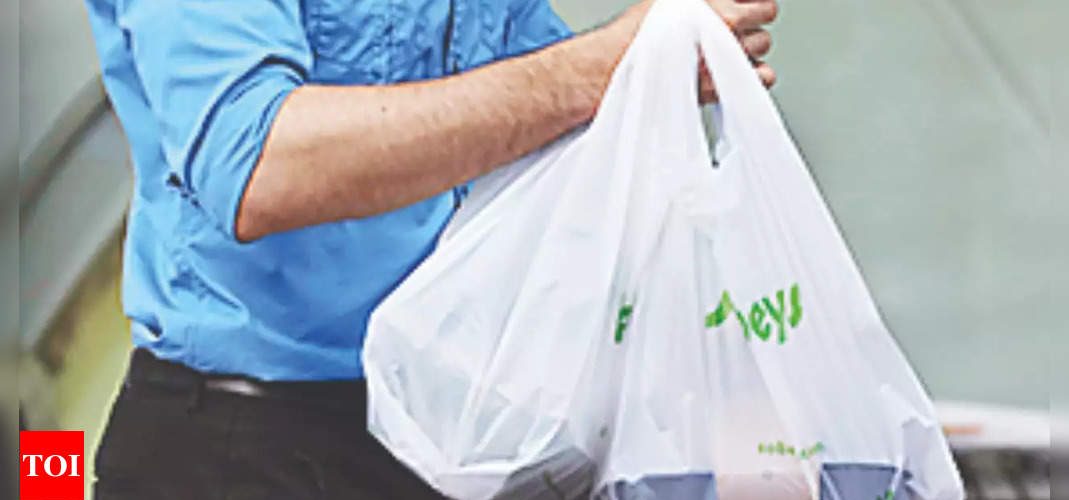NEW DELHI: There was a huge statement underlying Prime Minister Narendra Modi’s appearance in Parliament wearing a sleeveless jacket made of material recycled from plastic bottles early this year. Not only did it show how intrinsic plastic is to our day-to-day lives but also conveyed how we could transition from a “throwaway economy” to a “reuse economy” that would help save resources and simultaneously deal with the growing menace of hazardous waste.
Statistics show that 50% of plastic waste in the country remains unutilised, finding its way to landfills and water bodies, polluting the air, water and soil and, ultimately, affecting human health, with micro-plastics (tiny shards of plastic up to 5 mm in length) even entering our food chain.
Banning a few hard-to-collect/recycled single-use plastic items with effect from July 1, 2022 and prohibiting the manufacture, import, sale and use of plastic carry-bags thinner than 120 microns (one micron is a thousandth of a millimetre) from December 31 the same year may only be a limited answer to a big problem.
That’s why the government last year came out with rules – notified as extended producer responsibility (EPR) – to streamline collection and recycling of plastic waste. It also has provisions for waste generators to earn tradable credits by efficiently managing plastic waste.
Meanwhile, there has also been a global effort at the UN level to end plastic pollution. All member countries, including India, are working together to develop a legally binding instrument on plastic pollution, and aim to finalise it by end 2024.
Globally, 353 million tonnes of plastic waste was generated in 2019, with only 9% of it recycled. Another 19% was incinerated, while 50% ended up in landfills and 22% evaded waste management systems.
Sensing the urgency, talks among countries have focused on measures considering the entire lifecycle of plastics, from extraction and product design to production to waste management. Such an agreement may lead to a thriving circular economy based on a global financial mechanism to support developing countries.
Concern for human and environmental wellbeing led to this TOI partnership with ITC and Recycle India Foundation. “YiPPee! Better World: Create Magic aims to convert plastic waste into playground equipment in parks across four cities – Delhi-NCR, Kolkata, Mumbai, and Bengaluru,” said Kavita Chaturvedi, COO (Snacks, Noodles & Pasta), ITC Foods Division, adding, “Parks are an integral part of our society and through this campaign we want to create magic in children’s lives … while calling on the larger community to participate in the movement.”
The partners will collect plastic waste and epicycle them. This “has never been tried in India at this scale – installing this upcycled equipment in 16 parks across these four cities and making sure children avail of the benefits and are educated regarding the recycling of plastic,” said Recycle India Foundation co-founder and secretary Ashish Agarwal, adding that the campaign would “showcase the magic of recycling” and make people aware “about proper waste management and the potential of wealth in waste”.
Statistics show that 50% of plastic waste in the country remains unutilised, finding its way to landfills and water bodies, polluting the air, water and soil and, ultimately, affecting human health, with micro-plastics (tiny shards of plastic up to 5 mm in length) even entering our food chain.
Banning a few hard-to-collect/recycled single-use plastic items with effect from July 1, 2022 and prohibiting the manufacture, import, sale and use of plastic carry-bags thinner than 120 microns (one micron is a thousandth of a millimetre) from December 31 the same year may only be a limited answer to a big problem.
That’s why the government last year came out with rules – notified as extended producer responsibility (EPR) – to streamline collection and recycling of plastic waste. It also has provisions for waste generators to earn tradable credits by efficiently managing plastic waste.
Meanwhile, there has also been a global effort at the UN level to end plastic pollution. All member countries, including India, are working together to develop a legally binding instrument on plastic pollution, and aim to finalise it by end 2024.
Globally, 353 million tonnes of plastic waste was generated in 2019, with only 9% of it recycled. Another 19% was incinerated, while 50% ended up in landfills and 22% evaded waste management systems.
Sensing the urgency, talks among countries have focused on measures considering the entire lifecycle of plastics, from extraction and product design to production to waste management. Such an agreement may lead to a thriving circular economy based on a global financial mechanism to support developing countries.
Concern for human and environmental wellbeing led to this TOI partnership with ITC and Recycle India Foundation. “YiPPee! Better World: Create Magic aims to convert plastic waste into playground equipment in parks across four cities – Delhi-NCR, Kolkata, Mumbai, and Bengaluru,” said Kavita Chaturvedi, COO (Snacks, Noodles & Pasta), ITC Foods Division, adding, “Parks are an integral part of our society and through this campaign we want to create magic in children’s lives … while calling on the larger community to participate in the movement.”
The partners will collect plastic waste and epicycle them. This “has never been tried in India at this scale – installing this upcycled equipment in 16 parks across these four cities and making sure children avail of the benefits and are educated regarding the recycling of plastic,” said Recycle India Foundation co-founder and secretary Ashish Agarwal, adding that the campaign would “showcase the magic of recycling” and make people aware “about proper waste management and the potential of wealth in waste”.



